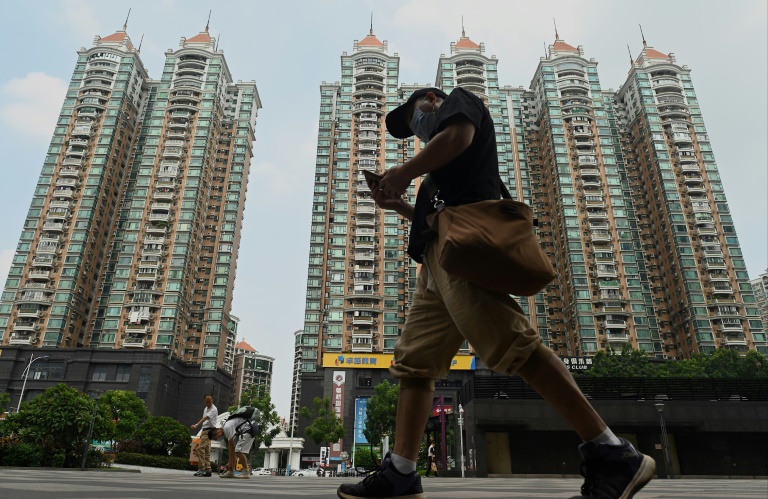Equities fluctuated in Asia on Tuesday, with investors nervously keeping an eye on troubled property giant China Evergrande after fears over its possible collapse sparked a rout across global markets.
The crisis at one of China’s biggest developers added to an already downbeat mood on trading floors, where dealers were also juggling an expected tightening of monetary policy by the Federal Reserve, rising Covid infections and a slowing global recovery.
Meanwhile, a battle in Washington to raise the US debt limit was also fuelling concern that the government could miss payments on its debt obligations, sparking a disastrous default.
Hong Kong-listed real estate firms — which took the brunt of the selling on Monday, tanking more than 10 percent — managed to squeeze out gains in the morning as bargain-buyers moved in. But there remains a lot of uncertainty.
Attention is on what happens next in the Evergrande saga, with the firm — wallowing in debts of more than $300 billion — due to pay interest to bondholders on two notes on Thursday. Most experts expect the firm to default on the payments, though it does have a 30-day grace period afterwards.
Still, analysts said the nervousness on markets comes from a lack of clarity from leaders in China, which was observing a national holiday on Monday and Tuesday.
Evergrande’s woes have been exacerbated by strict new rules introduced by Beijing to rein in runaway debt at the country’s developers, essentially cutting off the firm’s ability to finish its properties and make cash.
“Even though most people don’t expect Evergrande to collapse all of a sudden, the silence and a lack of major actions from policymakers is making everyone panic,” said Ding Shuang at Standard Chartered.
“I expect China to at least offer some verbal support soon to stabilise sentiment.”
– US default warning –
Hong Kong’s Hang Seng Index, which plunged more than three percent Monday, edged down 0.1 percent.
Henderson Land, New World Development, Sino Land and Sun Hung Kai Properties all rose, while Macau-based casino operators also enjoyed gains after last week’s crash fuelled by plans for a government crackdown on the industry.
Tokyo lost more than two percent as traders returning from a long weekend played catch-up with Monday’s global sell-off. Wellington was barely moved, while Mumbai and Jakarta also fell. Sydney, Singapore, Manila and Bangkok rose.
London, Paris and Frankfurt bounced back in opening exchanges.
Ratings agency S&P said in a report this week that officials would not likely step in unless they thought the crisis could cause widespread risks, though analysts played down any concerns that it could play out like the collapse of Wall Street titan Lehman Brothers in 2008 during the global financial crisis.
Aside from Evergrande, focus this week is on the Fed’s latest policy meeting, with observers predicting it will set out its timetable for tapering the vast bond-buying monetary easing programme that has been a key driver of a global recovery for more than a year.
Officials have flagged they will begin winding back this year as they look to temper surging inflation but the prospect of the punch bowl being removed is tempering that rally.
“Markets are clearly having some angst on the potential spillover effects from Evergrande, along with some nervousness over the September (policy) meeting,” said Cliff Hodge, of Cornerstone Wealth.
“We’ve been in the camp that we’re overdue for a correction, something in the five to 10 percent range that is a buyable pullback. At the moment, we’re not worried about a market crash. The Fed and Evergrande are not new.”
All three main indexes on Wall Street ended well in the red Monday.
There is a growing concern that US lawmakers will not reach an agreement to raise the country’s debt ceiling to keep the government running and pay its bills, with Republicans against the move.
Treasury Secretary Janet Yellen warned in an article for The Wall Street Journal that a default would “likely precipitate a historic financial crisis that would compound the damage of the continuing public health emergency”.
Bitcoin fell to its lowest level since early August, touching $40,237 before bouncing back slightly, having been swept up in the global sell-off on Monday.
– Key figures around 0720 GMT –
Hong Kong – Hang Seng Index: DOWN 0.1 percent at 24,081.61
Tokyo – Nikkei 225: DOWN 2.2 percent at 29,839.71 (close)
London – FTSE 100: UP 0.8 percent at 6,956.52
Shanghai – Composite: Closed for a holiday
Dollar/yen: UP at 109.59 yen from 109.38 yen at 2050 GMT
Euro/dollar: UP at $1.1730 from $1.1726 on Friday
Pound/dollar: UP at $1.3672 from $1.3656
Euro/pound: UP at 85.79 pence from 85.84 pence
West Texas Intermediate: UP 1.2 percent at $71.15 per barrel
Brent North Sea crude: UP 1.2 percent at $74.79 per barrel
New York – Dow: DOWN 1.8 percent at 33,970.47 (close)










